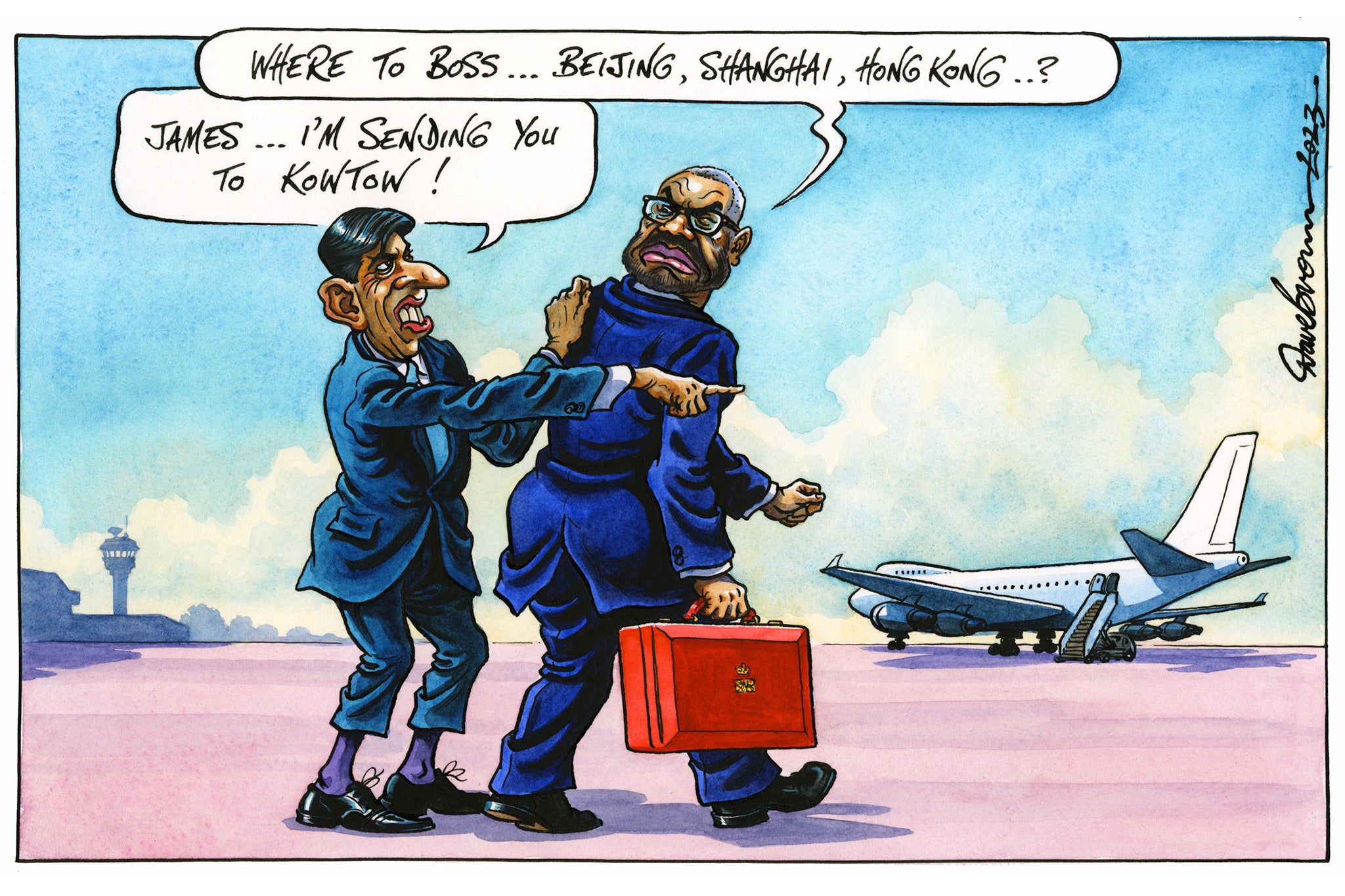The foreign secretary must play a delicate game to reset our relationship with China
Editorial: James Cleverly must play to win, because the stark truth is that the West cannot have both China and Russia as enemies simultaneously

The foreign secretary, James Cleverly, is in China with two informal aims in mind, both vital to the British national interest.
First, he must prepare – and smooth – the geopolitical ground in preparation for Rishi Sunak’s scheduled meeting with Xi Jinping at the G20 meeting in India next month. Second, Mr Cleverly will need to try to peel China away from its “friendship without limits” (in reality a dangerous liaison) with Vladimir Putin, and persuade the Chinese leadership that an open-ended war in Ukraine is not only indefensible on the grounds of morality and international law, but contrary to China’s own national interests.
Formally, and entirely rightly, Mr Cleverly will also need, politely but firmly, to remind his interlocutors that human rights abuses in Hong Kong and towards the Uyghur Muslim people are unacceptable, as is aggression towards Taiwan and expansionism across the South China Sea.
So he has his work cut out for him, to say the least, and he is not being assisted by those on the right of his party who insist on treating China as a pariah and an outright enemy. No one thinks the Chinese Politburo stands for the brotherhood of man – there are indeed still the obdurate “appalling old waxworks” that King Charles observed when he attended the handover of Hong Kong in 1997 – but it can do British interests a great deal of damage.
Mr Cleverly understands that sanctioning and lecturing China won’t make the People’s Republic become a better world citizen, and would very likely be counterproductive. And, at a time when Mr Putin’s Russia represents the clearest and most immediate threat to world peace, it is now essential to try to draw China onside, and closer to the West. If America is gripped by a paranoiac sinophobia, that is all the more reason for the UK to follow a more temperate path of engagement.
With Russia seemingly intent on re-establishing its old empire in Eastern Europe, this is a moment when there is no alternative to realpolitik. Foreign policy should have an ethical dimension, but this means that the safety and human rights of the people of Ukraine have to be accounted for just as carefully as those of the citizens of Hong Kong and Xinjiang province.
If President Xi can help to broker a just peace in Ukraine, and one that restores Ukrainian sovereignty to the satisfaction of Kyiv, then a further rapprochement with China should be pursued. Caution is needed, but the deal between Iran and Saudi Arabia that Beijing helped to deliver in order to end their proxy war in Yemen gives some hope that China can be a force for good. However, there’s no room for naivety.
The foreign secretary arrived in Beijing with an agenda that would tax a Palmerston, a Metternich or a Kissinger – but Mr Cleverly is at least approaching his delicate and complex mission in the right frame of mind. Though he cannot quite say as much, China, as an industrial, technological and military superpower, is simply too big to ignore, too powerful to attempt to bully, and too important simply to abuse.
Right now, the world, as well as the UK, doesn’t need a sullen, alienated, isolated China that has been persuaded into alliances with the likes of Russia and Iran. Nor would the global economy benefit from the sort of protectionism that pushes China into recession and destabilises its already shaky financial foundations and volatile real-estate sector. The world benefits, as it has for decades, from a China that plays a constructive part in world affairs, treats its people properly, trades fairly (mostly), and respects its neighbours.
At times during recent decades, friendly relations were the norm. The “golden era” of Chinese-British relations that formed such an important plank of David Cameron’s foreign policy may have disappeared, but there is no good reason for the West to slide into a cold war with China while supporting Ukraine in its very hot war with Russia. A brutal truth: the West cannot have both China and Russia as enemies simultaneously.
Mr Sunak sees China as a “systemic challenge” to the rules-based international order, but he has chosen the path of dialogue rather than confrontation and needless provocation, and Mr Cleverly needs to be the human embodiment of that balanced approach. The chances that the UK will succeed in winning every argument with China are zero, but relations do need to be stabilised for the sake of world peace, and of maintaining Chinese adherence to climate-change targets.
There have been no high-level bilateral meetings between the UK and China since 2018, when Jeremy Hunt was Theresa May’s foreign secretary. The reset is overdue. Mr Sunak and Mr Cleverly’s efforts are, however, badly compromised by the Tory sinophobes, and by a surprisingly ill-timed intervention on the part of the foreign affairs select committee, which has decided gratuitously to describe Taiwan as an “independent” state.
In truth, in international law it is no such thing, and nothing will inflame an official of the Chinese authorities more than any hint that Taiwan is anything other than an integral part of China, and is to be reunited with the mainland by peaceful means ASAP.
It’s hardly his fault, but Mr Cleverly will have to talk his way out of that one during his arduous programme of talks and lavish banquets. Good luck with that, foreign secretary.






Join our commenting forum
Join thought-provoking conversations, follow other Independent readers and see their replies
0Comments